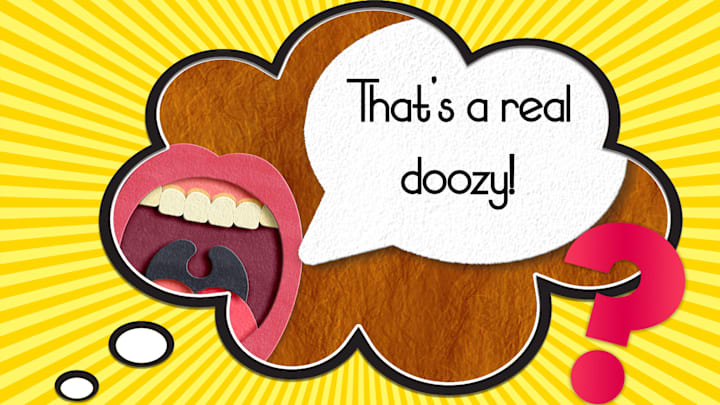If anyone has ever told you a sensational story involving twists, turns, and other hard-to-believe elements, you might have said, “Boy, that’s a real doozy.” The same goes for a severe weather event like a snowstorm: it’s a doozy of a blizzard. Anything extraordinary often gets slapped with the doozy label to help the listener express their surprise or astonishment at the highs and lows of someone’s fate or fortune.
But what exactly is a doozy? And why do we associate it with extreme highs and lows?
According to Merriam-Webster, the word doozy first appeared in reference to something outlandish or extraordinary in 1916, though one can find mentions of it as far back as 1904. (At that time, doozy was also in use as an adjective meaning stylish or splendid.)
One such example comes from the May 11, 1916 edition of The Paxton Record of Paxton, Illinois, which read:
“The Melvin Band is planning on celebrating the 4th and 5th this year and if everything comes out just like the plans indicate there’s going to be something doing every minute here on these days. The last celebration was a ‘doozy’ and why not make this one just a little better than that.”
The phrase a real doozy came later, proliferating in the 1950s and taking on a somewhat sarcastic tone. “The advertising boys … have come up with a real doozy this time,” read a Hutchinson News editorial on February 5, 1950, that went on to excoriate a safety razor ad for invoking war to help sell their wares.
Doozy was most likely adopted—and altered—from the English slang use of daisy, which was common in the 1800s to mean something special or beautiful. Your significant other might be a real daisy; or maybe your dog; or maybe a new car.
Daisy found its way into North America in the 19th century. In the 1890s, an Italian actress named Eleonora Duse (doo-say) was popular for her naturalistic approach to performing. In the word gumbo that is American vernacular, it’s possible daisy, Duse, and doozy grew intertwined, with doozy emerging as the sole signifier of unique traits.
What it isn’t in reference to is the Duesenberg car, which is sometimes cited as the origin of the word. These vehicles were singled out for their significant cost: around $25,000 at a time most vehicles were just a fraction of that. People also nicknamed them Duesies. But the Duesenberg didn’t debut until 1920, years after doozy was already in circulation. The claim is—well, you can guess.
Have you got a doozy of a Big Question you'd like us to answer? If so, let us know by emailing us at bigquestions@mentalfloss.com.
